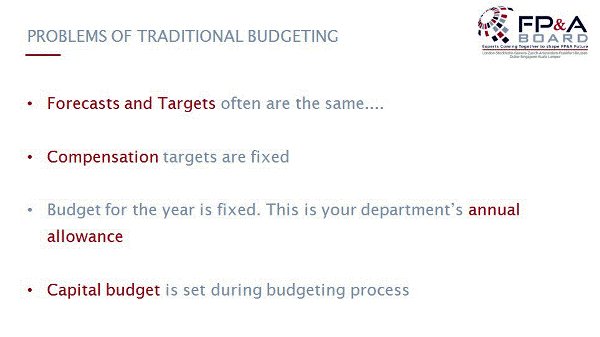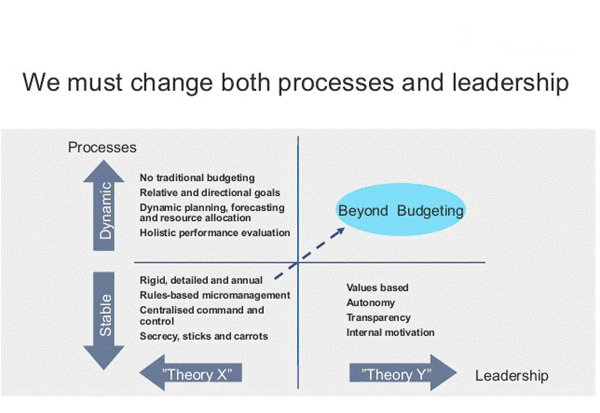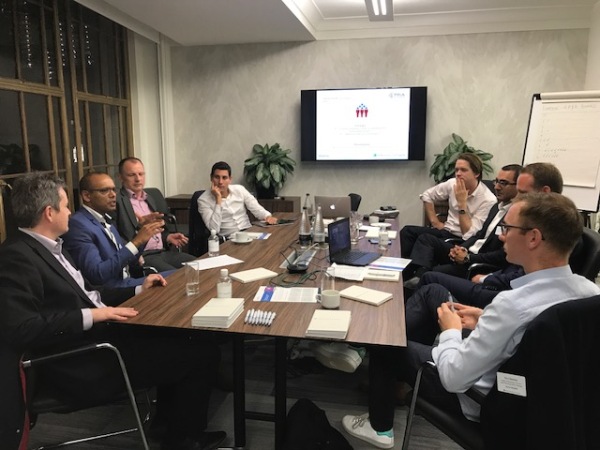 The Beyond Budgeting concept has been known for over fifteen years, but it is still not widespread around the globe. Although many companies are not satisfied with their traditional budgeting practices, they are not ready to abandon them yet.
The Beyond Budgeting concept has been known for over fifteen years, but it is still not widespread around the globe. Although many companies are not satisfied with their traditional budgeting practices, they are not ready to abandon them yet.
This September was a special month for the London FP&A Board which celebrated its fourth birthday and its successful expansion to 11 countries, 15 cities on 4 continents. The 17th London FP&A Board meeting was devoted to the subject of Beyond Budgeting. The meeting generated many valuable insights which Larysa Melnychuk, Managing Director at FP&A Trends Group and Founder of the International FP&A Board, shared in this interview.
A.C.: Why did the subject of Beyond Budgeting become the London FP&A Board's main focus?
L.M.: The Beyond Budgeting concept is very interesting, however it looks like companies are not ready to completely abandon budgets just yet.
At the beginning of the meeting, the Board members were asked to rate on a scale of 1 to 10 how painful the budgeting process is for their companies (1 being not painful and 10 being extremely painful). Most of the participants rated it about 10, with some members stating that it must be around 20.
Everyone agreed that budgeting is not only expensive, it is also a very time-consuming process. According to the research conducted by the Hackett Group, about 25,000 person-days are spent for a billion dollars of revenue. To make it worse, the budget becomes irrelevant on the day it is released.

All these factors urge an increasing number of companies to consider transforming their traditional budgeting processes or even to completely abandon the budget. However, at the end of the meeting, the Board came to the conclusion that most of the organisations are not ready to implement the BB concept yet. It is a business paradox – companies are not happy with their current traditional process, but continue to carry on as before. This will be quite a journey!
A.C.: What are the main barriers that prevent companies from going Beyond Budgeting?
L.M.: The biggest barrier is business culture. The budgeting process is so much embedded into the culture that it will take time to find alternative methods. Budgeting drives behaviour and helps to allocate resources. It is used to communicate annual results to stakeholders and investors. I must say however that it is possible to abandon the budget, but I will not go into details because it would require a separate discussion.
A.C.: There are still a number of well-known organisations that have been implementing the BB concept. What are their experiences?
L.M.: An organisation can reap a lot of benefits if it implements the Beyond Budgeting concept. The most obvious benefit is that the concept helps to transform the organisational culture and its planning process from judgmental and biased to collaborative and analytical.
The BB philosophy also creates a climate based on competitive success and flexibility. It removes the environment of “political games” and “target negotiations” that have always been a part of the traditional budgeting process.
There are quite a few well-known and agile companies that operate within the BB communities, for example, Toyota, Volvo, Lego, The World Bank, Danone, Maersk Group and many others. Those companies have realised the tremendous potential of the implementation of a flexible and dynamic planning process.
Statoil, one of the leading international energy companies, went beyond budgeting in 2005. Bjarte Bogsnes, Vice President, Performance Management Development at Statoil, defines Beyond Budgeting as follows: "The main purpose is liberation from dictatorship, micromanagement, number worshipping, calendar periods, hierarchies, secrecy, stick and carrot”. The slide below illustrates what should be changed in order to go beyond budgeting.

A.C.: The Swiss Post has also abandoned the budget. Its case study was presented at the Board. What were the key points of the presentation?
L.M.: It was delivered by Stefan Spiegel, CFO SBB Cargo AG, the former Head of Group Controlling of Swiss Post's Retail Division. In 2001, the management decided to completely change its strategy. Stefan explained how the finance function supported the cultural change and how BB helped to detect effective potentials without demanding unrealistic results. The Swiss Post used the BB concept to promote entrepreneurial thinking within the company. You can read a thorough analysis of this case on the FP&A Trends resource.
A.C.: The meeting was also attended by a thought leader and author Steve Morlidge, a former European chairman of BBRT, who successfully implemented BB in Unilever. What insights did he share with the Board?
L.M.: At the meeting Steve drew conclusions from the Swiss Post case study and briefly reviewed the BB process. Steve mentioned that Beyond Budgeting does not only helps businesses to adapt to changes in the organisational environment, but also creates opportunities for them and improve customer and employee satisfaction. To make it easier to understand the concept of BB Steve compared it to an operating system, which is hidden from view, but crucial for the functioning of the entire system.

Steve also answered some questions from Board members and at the end of the meeting his new book called “The Little Book of Beyond Budgeting” was distributed to every participant of the Board.
On our resource, you can find some articles about the BB concept written by Steve.
A.C.: It sounds like the meeting was very productive. What conclusions did the Board arrive at?
L.M.: Everybody agreed that although it is clear that the budgeting process is outdated and expensive, organisations are not ready to completely abandon it as it is embedded into their business culture. But the transition process has already begun in the industry with many implementations of flexible planning processes, such as driver-based planning, rolling forecast and etc.
The Board came to the consensus that some companies have already started leaning towards the BB concept; adjusting and transforming their fixed budgets to more flexible and dynamic versions. Every company takes the journey at its own pace – the transformation is not going to happen immediately. We hope to see more cases of such transformations in the coming years and the Board will continue to monitor them around the globe.
The London FP&A Board
The London FP&A Board was created on 19th September 2013. Now Board chapters are established in 15 cities in Europe, the Middle East, Asia, the USA and Australia.
On 28 September 2017, 25 senior finance professionals representing international companies such as Airbus, Centrica, GSK, Johnson & Johnson, Sony Mobile, Starbucks, Steelcase, The Economist, United Technologies, to name but a few, gathered in London to discuss the concept of Beyond Budgeting. We were lucky to have two remarkable keynote speakers – Stefan Spiegel, CFO at SBB Cargo (Railfreight), and Steve Morlidge, author and thought leader.

Sponsors of this London FP&A Board meeting
We are grateful to our global partners – Tagetik, the market leader in corporate performance management solutions, and Michael Page, one of the world's leading professional recruitment consultancies, for their great support and collaboration.


